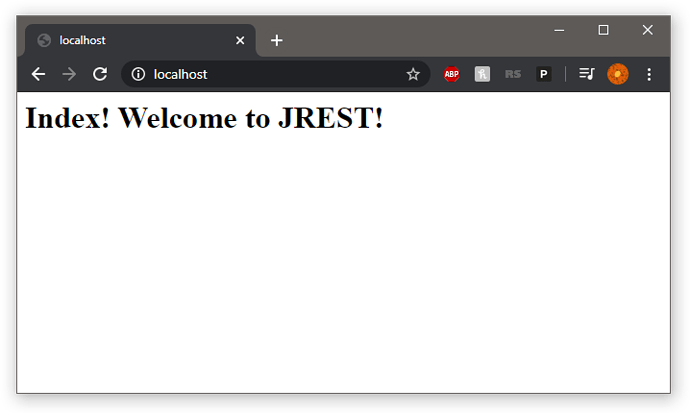This is a small project I created while making a Runescape bot. I needed a clean way to have multiple bots communicate with eachother, and I wanted it to work in a RESTful way. Spring Boot takes a year to turn on, so I needed something fast, and most other libraries require a million dependencies.
So here’s this fun little thing I whipped up in 2 days. It has fast startup time, and only requires Gson as a dependency.
Please don’t use this in production code… This is just a hobby project! Use something that’s been tried for much longer!
GITHUB:
Here’s some examples:
Synchronous Get:
RequestEntity<String> request = new RequestEntity<>(HttpMethod.GET);
ResponseEntity<String> response = request.exchange("http://localhost/testAPI", String.class);
System.out.println(response.getBody());
Asynchronous Get:
RequestEntity<JsonObject> request = new RequestEntity<>(HttpMethod.GET);
request.exchangeAsync("http://localhost/testJson", JsonObject.class, (response)->{
System.out.println(response.getBody());
});
Simple REST Server:
public class TestServer extends RestServer {
public TestServer() {
/**
* Test Endpoint. Returns static String
*/
this.addEndpoint(HttpMethod.GET, "/testAPI", (request)->{
return new ResponseEntity<String>(HttpStatus.OK, "Hello From Server!");
});
/**
* Test Post endpoint. Returns your posted data back to you.
*/
this.addEndpoint(HttpMethod.POST, "/testPost", MediaType.ALL, MediaType.ALL, (request)->{
return new ResponseEntity<String>(HttpStatus.OK, request.getBody().toString());
});
/**
* Test JSON endpoint. Returns a JSON object.
*/
this.addEndpoint(HttpMethod.GET, "/testJson", MediaType.ALL, MediaType.APPLICATION_JSON, (request)->{
JsonObject jsonObject = new JsonObject();
jsonObject.addProperty("TestKey", "Hello World!");
return new ResponseEntity<JsonObject>(HttpStatus.OK, jsonObject);
});
}
@Override
public int getPort() {
return 80;
}
public static void main(String[] args) {
new TestServer();
}
}
Specifying Generic Body/Return Types:
/**
* SERVER CODE
*/
this.addEndpoint(HttpMethod.POST, "/GetEmployee", JsonObject.class, (request)->{
JsonObject payload = request.getBody();
int id = payload.get("id").getAsInt();
String[] names = {
"Frank",
"Jeff",
"Oliver",
"Maxwell"
};
JsonObject response = new JsonObject();
response.addProperty("id", id);
response.addProperty("name", names[id-1]);
return new ResponseEntity<JsonObject>(HttpStatus.OK, response);
});
/**
* CLIENTCODE
*/
JsonObject body = new JsonObject();
body.addProperty("id", 1);
RequestEntity<JsonObject> request = new RequestEntity<>(HttpMethod.POST, body);
request.exchangeAsync("http://localhost/GetEmployee", JsonObject.class, (response)->{
JsonObject payload = response.getBody();
System.out.println("Employee data: ");
System.out.println("\tid: " + payload.get("id").getAsInt());
System.out.println("\tname: " + payload.get("name"));
});
DTO Serialization (using Gson):
public class TestDTO {
public TestDTO() throws MalformedURLException {
// Create payload
JsonObject body = new JsonObject();
body.addProperty("id", 1);
// Create request object
RequestEntity<JsonObject> request = new RequestEntity<>(HttpMethod.POST, body);
// Send request to server
request.exchangeAsync("http://localhost/GetEmployee", Employee.class, (response)->{
Employee employee = response.getBody();
System.out.println("Employee data: ");
System.out.println("\tid: " + employee.getId());
System.out.println("\tname: " + employee.getName());
});
}
public static void main(String[] args) throws MalformedURLException, IOException {
new TestDTO();
}
}
/**
* DTO used to represent employee information sent from server.
*/
class Employee {
private int id;
private String name;
public Employee() {
//
}
public int getId() {
return id;
}
public void setId(int id) {
this.id = id;
}
public String getName() {
return this.name;
}
public void setName(String name) {
this.name = name;
}
}
Also works like a webserver:
/**
* SERVER CODE
*/
this.addEndpoint(HttpMethod.GET, "/", MediaType.TEXT_HTML, (request)->{
return new ResponseEntity<String>(HttpStatus.OK, "<h1>Index! Welcome to JREST!</h1>");
});

